The benefits of ranking on the first search-engine results page (SERP) are more valuable than ever: 60% of clicks are generated by the top three SERP results, while the average CTR (click-through rate) for the top spot is 36.4%, according to a study by Optify.
Not all CTRs are created equal, however. Although head, or high-volume, search terms, yield higher CTR for position No. 1 on the first SERP, low-volume, long-tail terms, generate better overall CTR on page one.
Below, other findings from Optify's study, The Changing Face of SERPs: Organic Click Through Rate, based on analysis of organic keyword visits (Google US) gathered from Optify's software for a variety of B2B and B2C websites in December 2010.
The CTR curve (chart below) supports the traditional understanding of SERPs: Ranking on the first page is far more valuable than ranking anywhere else.
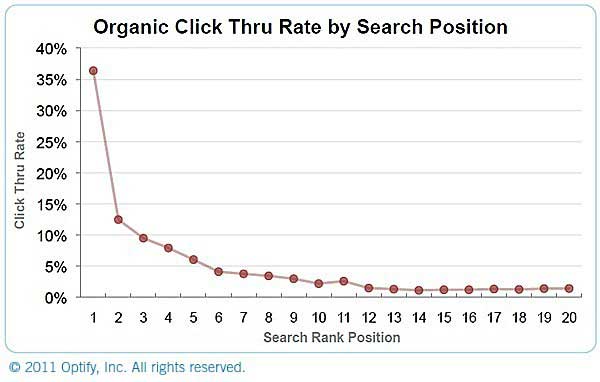
Moreover, the results show how moving keywords up within page No. 1 can yield accelerating benefits. For example, by doubling investments to move from the second position to the first, one could triple visits for that keyword.
Results Page 1 vs. Page 2
But given the volatile nature of SERPs, a brand's exact position is less predictable than the page it ranks on.
Comparing first-page with second-page performance demonstrates further the importance of appearing on the first SERP: Average CTR on page No. 1 is 8.9%, compared with 1.5% average CTR for page No. 2.
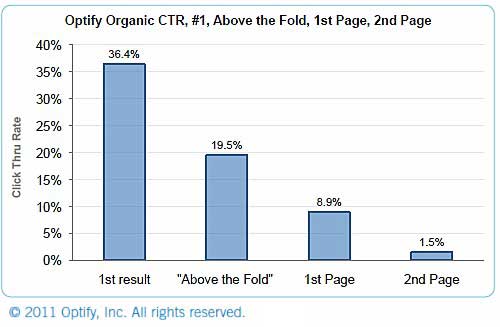
With such low average CTR for second-page results, ranking below page No. 2 is likely good for monitoring traffic trends, but may offer little business value.
Looking for solid, substantiated information about search engine marketing from the industry's best resources? The 84-page Search Engine Marketing Factbook featuring 55 charts provides data on who is using search engines and how, as well as data on keywords, clicks, and paid search metrics. This search-related factbook consists of chapters 1 & 3 from the larger Digital Marketing Factbook a 144-page compilation of data and 110 charts that also covers email marketing and social media.
Not All CTRs Created Equal
High-volume, more generic, head terms, (those with over 1,00 monthly searches (Google US)) perform differently than low-volume, more specific, long-tail terms (less than 100 monthly searches (Google US)).
For example, average CTR for head terms at position No. 1 is 32%, compared with 25% for long-tail terms:
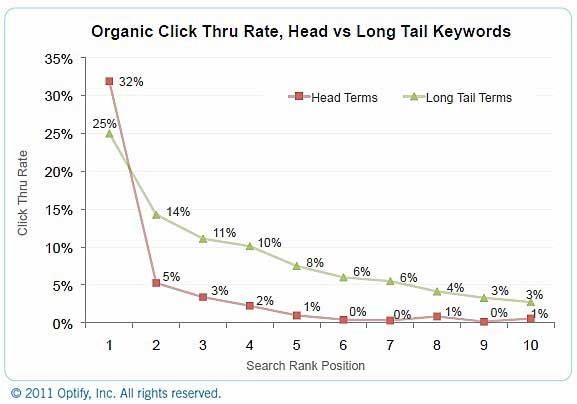
Long- tail terms, however, deliver better overall CTR on page No. 1 (4.6% average CTR for head terms vs. 9% average CTR for long-tail terms):
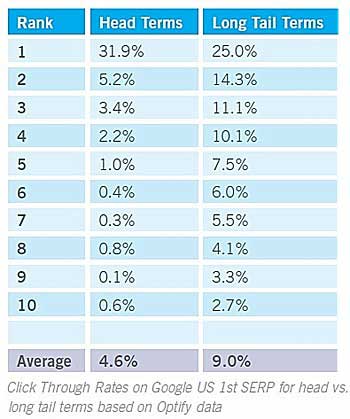
The results suggest that if a brand is optimizing for head terms, it won't likely register huge benefits until it reaches the top few positions. Brands that optimize for long-tail terms, however, can register relatively strong CTR almost anywhere on the first page, and there is less incremental benefit of moving up search results.
Organic CTR by CPC
Otpify also tested the effects of the CPC (cost-per-click) value of a keyword on its CTR, comparing "expensive" CPC terms, over $1.50 CPC on AdWords, with "cheap" CPC terms, under $0.25 CPC on AdWords.
On page No. 1, position No. 1, expensive CPC terms register a lower organic CTR on position No. 1 than cheaper terms, 30% vs. 20%.
In addition, cheap CPC terms will likely yield over double the CTR on the first page than expensive CPC terms:
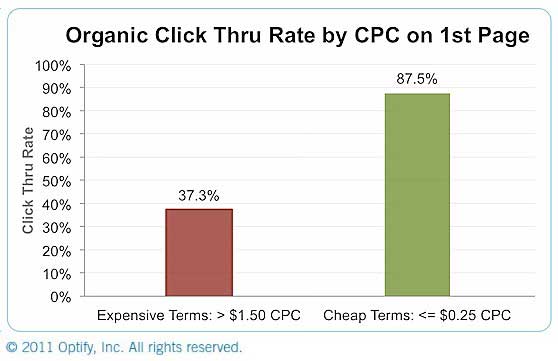
For example, given two keywords with the same search volume where one is a cheap keyword and the other an expensive one, potential organic traffic is over 2 times greater on the cheaper CPC term.
About the study: Findings are from Optify's analysis of organic keyword visits (Google US) gathered from Optify software data for a variety of B2B and B2C websites for the month of December 2010.



